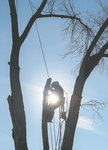Cloudy, 28° F
Twenty lucky property owners will have new trees planted on their properties this spring as part of an ambitious, long-term effort called Homesteader Roots to replace Powell’s aging trees. …
This item is available in full to subscribers.
The Powell Tribune has expanded its online content. To continue reading, you will need to either log in to your subscriber account, or purchase a subscription.
If you are a current print subscriber, you can set up a free web account by clicking here.
If you already have a web account, but need to reset it, you can do so by clicking here.
If you would like to purchase a subscription click here.
Please log in to continue |
|


Twenty lucky property owners will have new trees planted on their properties this spring as part of an ambitious, long-term effort called Homesteader Roots to replace Powell’s aging trees.
For homeowners in the city of Powell, replacing trees at the end of their lifecycle is “critical,” said Josh Pomeroy, local tree advocate and owner of Blue Ribbon Tree Service.
“A combination of age, disease and insects, plus neglect for many, many years means a lot of our biggest, oldest trees that we have in town are at the end of their life cycles,” he said.
Pomeroy has been working nonstop in his business to help homeowners remove trees — most showing signs of age and posing safety hazards. Within the next decade, the issue could grow much worse. About 60 percent of the trees in the city are green ash, a species under attack by the emerald ash borer. The insect has laid waste to millions of ash trees across the nation on its path west to Wyoming. The Cowboy State is now surrounded, as the ash borer has been reported in Colorado, Nebraska and South Dakota.
“When the emerald ash borer shows up, it’s going to look a lot different around here,” said Allan Knowles, Powell resident.
In its first year, the Homesteader Roots project will select 20 homeowners within the city limits, based on locations most suitable for the program. Those chosen will then select a tree from an approved list and Homesteader Roots volunteers will deliver, plant and water the tree for the first year. The program costs the homeowner a one-time fee of $50, covering about 10-20 percent of a typical fee for the service, Pomeroy said. He’s not sure how long it will take to get the 20 slots filled, but he’s looking to receive a lot of applications to help move the program past its first phase. “I’m hoping there’s a long waiting list,” he said.
Applications to receive the first trees through the Homesteader Roots project are now available at businesses throughout the city as well as City Hall.
Qualifying trees for the program will be slow-growing hardwoods, helping the city develop a new bio-diverse urban forest. The selections will be based on trees that grow well in the area and that have a long life span. Tree species like bur oak, shade-master honeylocust, Ohio buckeye and green-spire littleleaf lindens are on the list, but those offered will also depend on availability.
The program is a good deal for the city, said Tim Miller, Powell’s parks supervisor. “It will help diversify our urban canopy,” he said.
Miller took over in the city’s parks department when Del Barton retired in June last year. With Barton’s departure, it left the city without a certified arborist. But Miller and Jim Vanek are working to solve the problem, with both currently enrolled in certification classes. Miller’s part of the program will be to assess and approve new tree planting sites, and to issue permits if necessary.
The city is going through a similar process with trees on city property and in right-of-ways. Maintaining and replacing trees is an important part of the department’s responsibilities, Miller said.
“We replace about 20 to 30 trees a year,” he said.
A survey of trees on city property, easements and right-of-ways in 2018 revealed 2,161 trees in the city’s care. City employees remove and maintain most of the trees, but subcontract tree trimming and removal around power lines.
Miller has been with the parks department for 15 years and was also appointed by Mayor John Wetzel to serve on the city’s Tree Advisory Board. He’s currently filling out the 2020 Tree City USA application — a program the city has participated in for the past three decades.
Pomeroy points out that program volunteers and administrators generally won’t be able to enjoy the fruits of their labor.
“This program isn’t for us,” he said. “It’s for folks 40, 50 or 60 years down the road.”
Pomeroy hopes that some Powell residents will realize the value of the program in the future and plans to ask 4-H, Boy and Girl Scouts and other children’s organizations to help with the tree planting.